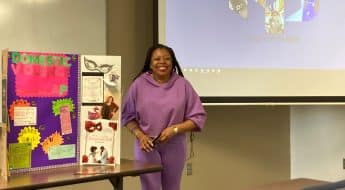Five ‘Secrets’ to College Success
Welcome/ Welcome back, MPTC students!
One of my favorite things about being an educator is getting to work with people who strive to better themselves every single day. I’ve been privileged to do that for nearly two decades now, and in that time, I’ve noticed five traits shared by the most successful students. The best part is that they require no special skills or talent.
1. Successful students write things down.
They have a planner or calendar of some kind. Sometimes it’s paper; sometimes it’s the Canvas calendar or Google calendar or iCalendar. The format doesn’t matter so much as the act of capturing their schedule and to-do list in one place.
Successful students also take notes. There is plenty of research to back up the benefits of taking notes. It keeps you focused; the mind-body connection improves memory retention; notes give us something to reference back to and study from when we forget what we read or heard.
2. Successful students communicate.
They communicate with their instructors. I can’t possibly be the first person to tell you that if you have a question, other people definitely have the same question. I’m saying it again because it’s 100% true. Please ask questions! Seek clarification, seek more information, and check your own understanding. As a teacher, I explain and present things in ways that make perfect sense to me. I appreciate knowing how that information is perceived by students. It helps me to be better and helps you be more successful. I’m not alone in this. All of my faculty colleagues are here to support your success. Ask the questions!
Communicate with your fellow students, too! Reach out. Get phone numbers or connect on Snapchat or whatever app you are all using today. Talk to each other before and after class and during break. Meet for coffee or lunch and chat about the class and life. Have a group text chain. There will be challenging times as you pursue your educational goals. If you are connected to other students who are experiencing the same things, you’ll realize those challenges aren’t unique to you, and that this is all just part of the process.
Communicate with our counselors, your adviser, the financial aid office, student life, the student veterans specialist, our diversity relations office, etc… We love our students here at MPTC! If you need something, we almost certainly employ someone to meet that need.
3. Successful students attend class.
For traditional classes this is more straightforward. If there’s a class meeting, make sure your body is in the classroom, and your mind is focused on learning. If you are an online student, acknowledge that you must devote time to going through the instructor-provided content. When you do, be focused. If there are lecture videos available, watch them and take notes as you do. If there are other videos, powerpoint presentations, or assigned readings, study them! And of course, take notes.
BONUS: If you have to miss class, do your own work to find out what you missed before reaching out to your instructor. Check Canvas and connect with a classmate. Then send a message to your instructor explaining what steps you’ve taken and asking specific questions.
Do not do this:
Hey, sorry I missed class. Did anything important happen?
Do something like this instead:
Hi [fill in instructor name] I apologize for missing class. I [insert reason you could not attend class – you do not have to disclose personal information]. I’ve already checked Canvas and found [insert what you found about the class material and assigned work], and I messaged [insert classmates’ names] to see if they could share notes with me. I was wondering, [insert questions]. I appreciate any help you can offer.
4. Successful students focus.
Put. Your. Phone. Away. I’m a parent, and I keep my phone near me in case my kids need me. I get it. I usually won’t try to police your phone usage in my class, but you should respect any teacher who does have a more defined cell phone or technology use policy. Even more challenging, though, is to enforce this on yourself when you’re studying alone.
Research tells us that it takes an average of 20+ minutes to achieve a focused state after a distraction. Every time you check your phone because Instagram, TikTok, Facebook, Snapchat, text, or whatever other app buzzes, you lose focus on the learning taking place in the classroom or in your room or at the library or at your kitchen table, and it will take at least 20 minutes to get back to that focused place where you can do real learning. If something distracts you in that 20 minutes, the clock resets.
Do what you can to limit distractions when you’re learning.
5. Successful students have goals.
Know why you are here. Some students know the career they plan to pursue. They have detailed timelines and can tell you what classes they will take each semester until they graduate. That’s wonderful.
“I am going to improve my math skills,” “I’m going to turn in every assignment on time in this class,” and “I’m going to join a student club to make more connections” are equally excellent goals.There is always a reason to learn and grow into a better version of yourself. Find the reasons that drive you for those days when raw motivation is in short supply.
As promised, no special talents needed! I send you all my very best wishes for a wildly successful semester! If I can help in any way, please reach out!


